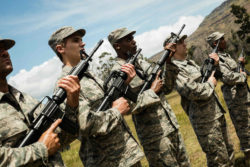 Explosive injuries sustained by soldiers at war and by citizens that find themselves victims of localized terrorism are often permanent. A good deal of the injuries caused by close contact with an improvised explosive device (IED) eventually—if not immediately—lead to the death of the sufferer.
Explosive injuries sustained by soldiers at war and by citizens that find themselves victims of localized terrorism are often permanent. A good deal of the injuries caused by close contact with an improvised explosive device (IED) eventually—if not immediately—lead to the death of the sufferer.
IEDs, commonly known as roadside bombs, were used extensively in the Iraq and Afghanistan wars. From the inception of the Iraq war until 2007, 63 percent of coalition deaths were blamed on IEDs.
Additionally, 66 percent of the deaths in the ongoing war in Afghanistan were caused by IED explosive injuries. IEDs have also been used in incidents of domestic and international terrorism, such as the 2013 Boston Marathon bombing and the 2005 London Bus bombing, according to the Orthopaedic Trauma Association.
IED Explosive Injuries
According to the Radiological Society of North America, injuries from IEDs can be categorized by whether they are primary, secondary, tertiary, or quaternary. Primary injuries are caused by the increased pressure and change in atmosphere surrounding the blast immediately afterwards.
Secondary injuries are related to shrapnel and flying debris under pressurized wind which can become embedded in flesh. Tertiary blast injury refers to when a victim experiences blunt trauma after the pressure forces him or her into an object such as a nearby tank, car, boulder etc. Finally, quaternary injury is a catch-all for burns, inhalation issues, and crushing of any body part.
Why Have IEDs Become So Prevalent?
Although IEDs are not limited to combat zones, as seen in the Boston Marathon and London Bus attacks, they were and are by far the most common cause of death, wounds, and necessary amputation in the Iraq and Afghanistan wars, as indicated by the Orthopedic Trauma Association.
In a presentation created by this professional organization, they connected this upsurge in IED use with the fact that the devices are made very inexpensively from materials on hand or nearby, can be easily hidden and moved in mass quantity, and are low-tech with simple means of detonation—usually a remote of some kind.
Iran and Its Role in Providing Munitions
Iran was identified and confirmed as a source of weaponry being funneled to extremist groups in Iraq by Admiral Mike Mullen in 2011. The Admiral was Chairman of the Joint Chief of Staff at that time. He claimed that the highest levels of the government of Iran were aware of this activity.
This provision occurred despite U.S. sanctions that had been placed on the country by Congress. These sanctions were intended to prevent access to funds that would support weapons construction and supply lines into neighboring countries.
In exchange for a large profit share, a few banks secretly facilitated the financing of this terrorism and went around the sanctions so placed. It is believed that this has also occurred in Afghanistan. The consequences have been a trail of death and dismemberment.
Under federal law, a combat veteran or his or her family can sue economic conspirators if the former was injured or killed as a result of an IED blast injury in combat. Three of the participating banking institutions have settled with the U.S. to date and there may be more to come.
If you or a loved one was injured or killed by an IED or EFP while fighting in the Iraq or Afghanistan wars, legal recourse is available. Get help now by filling out the form on this page for a FREE case evaluation.
The attorneys who work with Top Class Actions will contact you if you qualify to let you know if an individual lawsuit or anti-terrorist class action lawsuit is best for you. (In general, anti-terrorist lawsuits are filed individually by each plaintiff and are not class actions.) After you fill out the form, the attorneys who work with Top Class Actions will contact you if you qualify to let you know if an individual lawsuit or class action lawsuit is best for you. Hurry — statutes of limitations may apply.
ATTORNEY ADVERTISING
Top Class Actions is a Proud Member of the American Bar Association
LEGAL INFORMATION IS NOT LEGAL ADVICE
Top Class Actions Legal Statement
©2008 – 2026 Top Class Actions® LLC
Various Trademarks held by their respective owners
This website is not intended for viewing or usage by European Union citizens.
Get Help – It’s Free
Join a Free Iranian IED, EFP Lawsuit Investigation
If you qualify, an attorney will contact you to discuss the details of your potential case at no charge to you.
PLEASE NOTE: If you want to participate in this investigation, it is imperative that you reply to the law firm if they call or email you. Failing to do so may result in you not getting signed up as a client or getting you dropped as a client.
Email any problems with this form to [email protected].
Oops! We could not locate your form.













One thought on IED Explosive Injuries May Be Permanent or Lead to Death